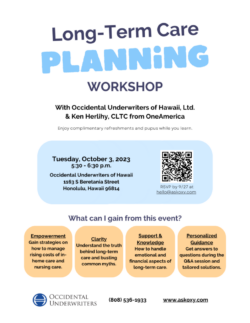Who needs life insurance?
Life insurance is an essential part of any financial plan. While life insurance provides security and protection for your loved ones when you are no longer here, it can also provide a reservoir of cash in some policies. Strategically planning for your future with life insurance ensures that you will have a well-rounded plan for years to come. If plans change, you can buy another policy or cancel an old one.
Living life with life insurance means that you can fully enjoy your time here without worrying about the what-ifs in life, and by providing peace of mind with life insurance, the burden of the unknowns is relieved from your shoulders.
First-time homeowners carry a lot of debt. If you were to pass away while still paying for your mortgage, how would your loved ones pay for the additional cost of owning a house? Life insurance provides protection from life’s unknowns and big what if’s. Instead of your family struggling to pay for your funeral payments, credit card debt, car payments, and mortgage, the insurance company will provide a benefit amount upon your passing which can pay for the entire amount of the house or condo and may even cover your additional debts.
Married couples and life partners are likely to both work and contribute to the household income. What happens when one person passes away and the household income decreases, but the same amount of bills need to be paid, plus funeral costs? The survivor is left with the burden of the loss of a loved one and the harsh reality of increased financial obligations. A life insurance policy’s death benefit can be spent in any way the beneficiary likes. Proceeds from a life insurance policy would help the surviving partner maintain their lifestyle by helping to pay bills and debt including mortgage payments, car payments, student loans, and credit card debt.
Taking on the new role of parenting, or adding an extra bundle of joy in your life can be both challenging and rewarding. Having a child can also be quite expensive with the typical American family spending $233,000+ raising a child from birth to age 18. For a middle-income family, housing accounts for 29% of costs, 18% for food, 16% for child care/education, according to the USDA.
Life insurance provides an income should one, or both parents pass away. The life insurance benefit can be used for costs of living including food, housing, child care, and education. If you are a single parent, the life insurance benefit is a financial lifeline for your child should you pass away.
See this Bankrate guide that covers which financial expenses soon-to-be parents can expect. It includes a breakdown of the different costs to consider when raising a child.
Many employers now offer group life insurance with a few thousand dollars of benefit to cover a small funeral cost, sometimes more. However, this is often not enough coverage especially if you have a family. If you are looking to move jobs, your group life insurance coverage will likely end creating a gap in coverage for you and your loved ones. Having your own individual life insurance policy means you won’t have a gap in coverage when you switch jobs.
If you’re starting your own business, a “key person” insurance coverage will help to protect your business by providing a benefit to replace the lost income and pay for business expenses in case of death or disability. Valued partners and employees have an enormous impact on your business both positively, but also negatively if they cannot perform their job. With a “key person” coverage you can use the benefit to buy out a partner without depleting company cash reserves, or use the cash to pay for expenses and buy time to fill in the gap.
- Individuals Looking Towards Retirement
Life insurance is important in creating a well-structured and well-rounded retirement plan. Permanent life insurance policies provide a reservoir of cash that you can use during retirement through the cash value component. Life insurance is also used for estate planning and may help your beneficiaries pay taxes and legal fees. Consult with your financial advisor on the best plan for your retirement needs.
The aging population is living longer, and many people in the United States rely on family members to care for them. This puts an enormous financial and emotional burden on loved ones as they try to cope with their ailing relatives. If you’re providing care for an aging relative, a life insurance policy is essential in making sure you have a backup plan to protect their continuity of care if you pass away.
Ending a relationship is a good time to reevaluate your existing life insurance before a divorce is finalized. If your current life insurance coverage lists an ex as a beneficiary, consider excluding them from your list. Don’t forget to review your beneficiaries after splitting up. In addition, consider purchasing your own life insurance policy, or adding a new one.




















